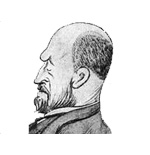
Henry James’s Literary Catholicism
THE CURIOUS CASE OF A WANNA-BE CATHOLIC
In one of his last tales, “The Bench of Desolation” (1909-1910), Henry James gives us this curious passage, curious all the more because he is not, so far as we can tell or will ever be able to tell, a real Catholic:
He [the protagonist on his bench] might, in these sessions, with his eyes on the grey-green sea, have been counting again and still recounting the beads, almost all worn. smooth, of his rosary of pain — which had for the fingers of memory and the recurrences of wonder the same felt break of the smaller ones by the larger that would have aided a pious mumble in some dusky altar-chapel.
The man knows his Rosary all right, in a rather nonsubstantive sort of way, but “pious mumble” is not an especially gracious phrase. The one thing we may be sure of is that here is an author anxious to weave some Catholicity into his text — otherwise quite un-Catholic — and let the fabric ravel as it may. James did so all his writing life. He would make endless metaphors by combining a Catholic element (a Rosary) with a secular element (memories, not Catholic at alb~ The result may be called, alternatively, a secular sacred or a sacred secular.
That — and comparable performances — is a striking example of literary Catholicizing, an ugly term of my own devising, useful in the designation of texts by persons who pose as Catholic when in real life they aren’t. Willa Cather in at least two of her major novels is just such another. James and Cather are the opposite of Evelyn Waugh, Graham Greene, Georges Bernanos, Francois Mauriac, even Flannery O’Connor and Walker Percy: All of these to varying degrees were recognized and read, with condescension and envy, as Catholic writers by a populace mainly un-Catholic, which knows not what it does (and so must be forgiven) but which holds Catholic Literature to be chic and cute. Consider the Times Literary Supplement as quoted on the back cover of The Diary of a Country Priest (Image Books paperback edition of 1954): “In daring to describe the awareness of the supernatural, M. Bernanos has successfully brought to birth a kind fiction which had seemed inconceivable.” Since 1954 the form has darkened: Now no ome especially loves Catholic Literature, or American Catholics either.
You May Also Enjoy
During the entire period of my wife's ailment, we received not a single telephone call, e-mail, or note from our clergy, let alone a visit or Holy Communion.
Kerouac was “not ashamed to wear the crucifix of my Lord... I believe in beatitude and that God so loved the world that he gave his own begotten son to it.”
Political correctness (PC) began around 1968, when the American Left yielded to intense neotribafism. PC…

